Or How To Brew a Different Social Relationship Based on Commoning Rather Than Alienation (including a br ief exploration of 800 years of history including both the use of Structural Adjustment Policies by the IMF and of the use of sugar in making alcohol)
Until recently I had no experience of brewing beer, but I did have a interesting revelation / discovery courtesy of Peter Linebaugh, the US based radical historian. The revelation occurred during an event organised by Bristol Radical History called ‘Down with the Fences: Struggle for the Global Commons’. It concerned a hidden history of the rights of commoners to subsistence and existence from public or private land. These rights were catalogued in a document called The Forest Charter written down in 1215, in a field in Rennymede. This document in essence enshrined in law the notion of the commons, and its’ brother document the Magna Carta, referred to the legal and political rights (trial by jury, the right to remain silent) that we have taken for granted even as they are under attack today. The two documents together defined limits to privatisation (a word relation to deprivation)[ 1 ]
The philosophy of collecting nettles
To collect nettles from public or private land is a process of usufruct (temporary possession, or use of of the advantages of another persons property). It is making use of waste (in legal terms – a piece of land not in any individuals occupation, lying in common). So to take nettles and then transform them into a brew for intoxication at a Folkmote (deliberate gathering of people, a general assembly, soviet or meeting) could be seen as a act of Commoning. [ 2 ]
By commoning you are moving away from the quaint practises of a yonder by imagining tomorrow. It is a verb describing any activity or process designed to increase the availability of the commons in everyday life. That is: the notion of something held in common, something that is free, outside of money exchange (but not a free for all). The protection of public resources from privatisation and enclosure – not by conservation and well meaning but nevertheless parallel enclosures – but a protection through an economic and direct relationship that resists the museum-ification of nature. The Diggers, the 16th Century Agrarian Communists that occupied St Georges Hill in Surrey to resist the removal of both themselves and their livelihoods from the landscape knew this, and planted corn to confirm it.
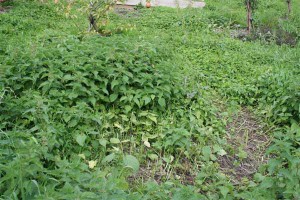
With all this in mind I set out to practice a bit of Herbiage (the right to collect herbs), in this case an attempt to make five gallons (forty pints) of nettle bew.
I collected the nettles – I can now call them Lops and Tops (invoking the right to take cuttings or trimmings of superflous growth of foliage) so then, two hundred lops and tops from Royate Hill Community Allotment in Bristol. No one minded as there were quite a lot, and I regulate my use. If I tried to take them all I’m sure someone would have come over and disputed what I was doing.
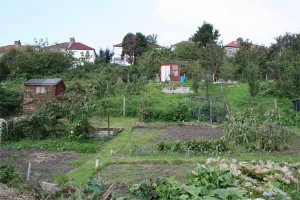
After gathering the nettles I went home, gave them a rinse and put them in a large pot. Add three gallons of water and bring to the boil. Watching the gas flicker on the stove made me think of Firebote (the right to gather firewood for fuel) and I remembered hearing about a proposal for a Hydrocarbon Commons called for by the Zapatistas of Mexico and the Ijaw in Nigeria [ 3 ]. These proposals made me think about the economist Garret Hardin who in the1960s wrote a text called ‘Tragedy of the Commons’. It talked of ecologies being destroyed and degraded because they are held in common. Because they are not a commodity – that is they have no (exchange) value – so in order for them to be protected and regulated they should be privatised. This way people will value them and be sensible in their use. He ignored thousands of years of communal negotiation and custom. He removed from the commons the very people that sustained the land, and in doing so provided the pretext for IMF/World Bank Structual Adjustment Policies. Ironically the forces he contended would protect the land, the free market, private profit – States and Capital – were the very ones that accelerated the degradation of the land to the point where we are now at the point of eco-systemic failure. I watched a film called ‘Queimada’ by Gillo Pontecorvo, also know as ‘Burn!’ about sugar plantations and guerilla uprisings whilst the nettles boiled for little more than one hour. When the film started I put one spoon of yeast into a jug, mixed in a bit (200 ml) of lukewarm water, and let it get frothy for a while.
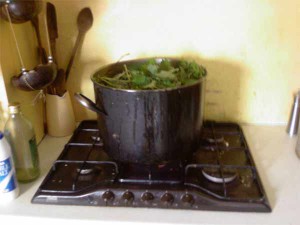
After the film I drained out the nettles, and mixed in three kilograms of sugar into the hot water, stirring to dissolve. Added 120g of Cream of Tartar. Then, transfered the nettle juice into a big bucket. adding two gallons of cold water. This got the mix up to five gallons and also makes the temperature nice and ready to add the yeast that should be frothing away. The yeast will eat the sugar, producing alcohol and carbon dioxide (which causes global warming). Although it could be argued it is domination of states & the free market which can only know ‘MORE’ through overproduction, transportation, product obsolescence, the constant harassment of individuals to purchase stuff and the general conditions of work / commodity production which causes climate change, not the emission of CO2 from human activities per se. [ 4 ] When I was thinking about this my mate Lisa brought around a book called ‘The Complete Home Winemaker and Brewer’ by Ben Turner which documents the history of brewing and how the using hops to flavour beer is intimately tied to the enclosures facilitating land grabs. The new market of hops replaced the previous use of herbs, including nettles, to flavour beers. This I never knew but was pleased as it seemed to place the use of nettles historically as something that was commoned.

After leaving the beer in the bucket somewhere not warm, not cold for about ten days, test it. If it still very,very sweet leave it for a bit longer. Otherwise it is ready to transfer into either big plastic pop bottles or into a five gallon brewing barrel. I notice that plastic is a component derived from current hydrocarbons resources, and wondered if using the plastic bottles in this way, of preventing them becoming waste, of transforming its value from ‘exchange’ to ‘use’ is alsoway of commoning..
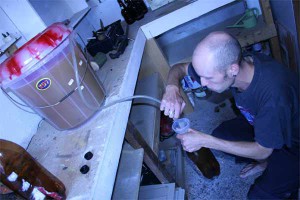
Our notion that self management is possible, and of the possibilities of autonomy, seems far far away in the UK. After the class struggles of the 70s, and the consequent flight of capital to lands far away, the intensification of work and the commodification of everything including culture – especially culture – gives the impression of a movement seemingly in retreat. For now. [ 5 ]
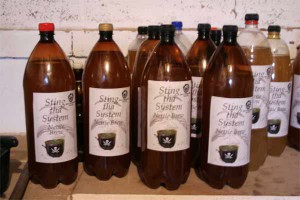
Anyway after about two weeks in the bottles the nettle beer was ready. It may be worth naming your brew so it reflects the space and place of where it came from or is going to. In this case ‘Sting Tha System’. The brew was served up to thirsty punters during the Sunday night cafe at Kebele, a radical social centre in Bristol:
Kebele is a space for organising, supporting and campaigning autonomously. Kebele is a community co-operative, run by volunteers on a not-for-profit basis and providing an alternative social space. We organise collectively without leaders and oppose all forms of authority.A cooperative is an autonomous association of persons united voluntarily to meet their common economic, social and cultural needs and aspirations through a jointly-owned and democratically controlled enterprise. [ 6 ]
You may notice that the menu refers to a Credit Crunch Crumble and a Surplus Value Salad. The credit bail outs of 2008 may prove to be a catalyst for all sorts of social currents.[ 7 ]
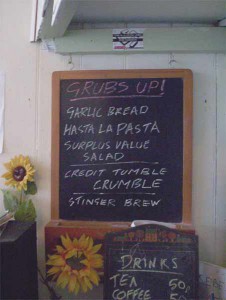
The brew in total cost £6, funded with donations and £1 commission from The Eccentric City. The next commissioned brew is a eighty pint pre- enclosure herb special called ‘King Gone’ and a post-enclosure hop wonder called ‘Queen Go’ created for Bristol Radical History Group November events called ‘Off With Their Heads’ on the theme of assassination, plots and regicide.
For other recipes and artworks concerning the commons see http://www.stuffit.org
Steve [ 8 ] Stuffit 2008.
- [ 1 ] See Peter Linebaughs book ‘The Magna Carta Manifesto: Commons and Liberties for All’ [back…]
-
[ 2 ]
See Massimo De Angelis book ‘The Beginning of History:Value Stuggles & Global Capital’:
http://www.commoner.org.uk/ [back…] -
[ 3 ]
See George Caffentzis ‘The Petroleum Commons’:
http://www.counterpunch.org/caffentzis12152004.html [back…] -
[ 4 ]
See ‘Modern Ecologism and its Prospects’:
http://www.lasthours.org.uk/archive/articles/two-three-manyapocalypses- modern-ecologism-and-its-prospects/ [back…] -
[ 5 ]
See ‘Long Lost Wildcat Strike in the UK’:
http://www.revoltagainstplenty.com/ [back…] - [ 6 ] See Kebele Social Centre Website: http://www.kebelecoop.org/ [back…]
-
[ 7 ]
See Mortgage Strikes / Credit Crunch Resistance:
http://mortgagestrike.ning.com [back…] - [ 8 ] A ‘Steve’ is a piece of working class east london slang that referred to going back to someone’s house after the pub i.e. ‘Would you like to go for a steve?’ [back…]